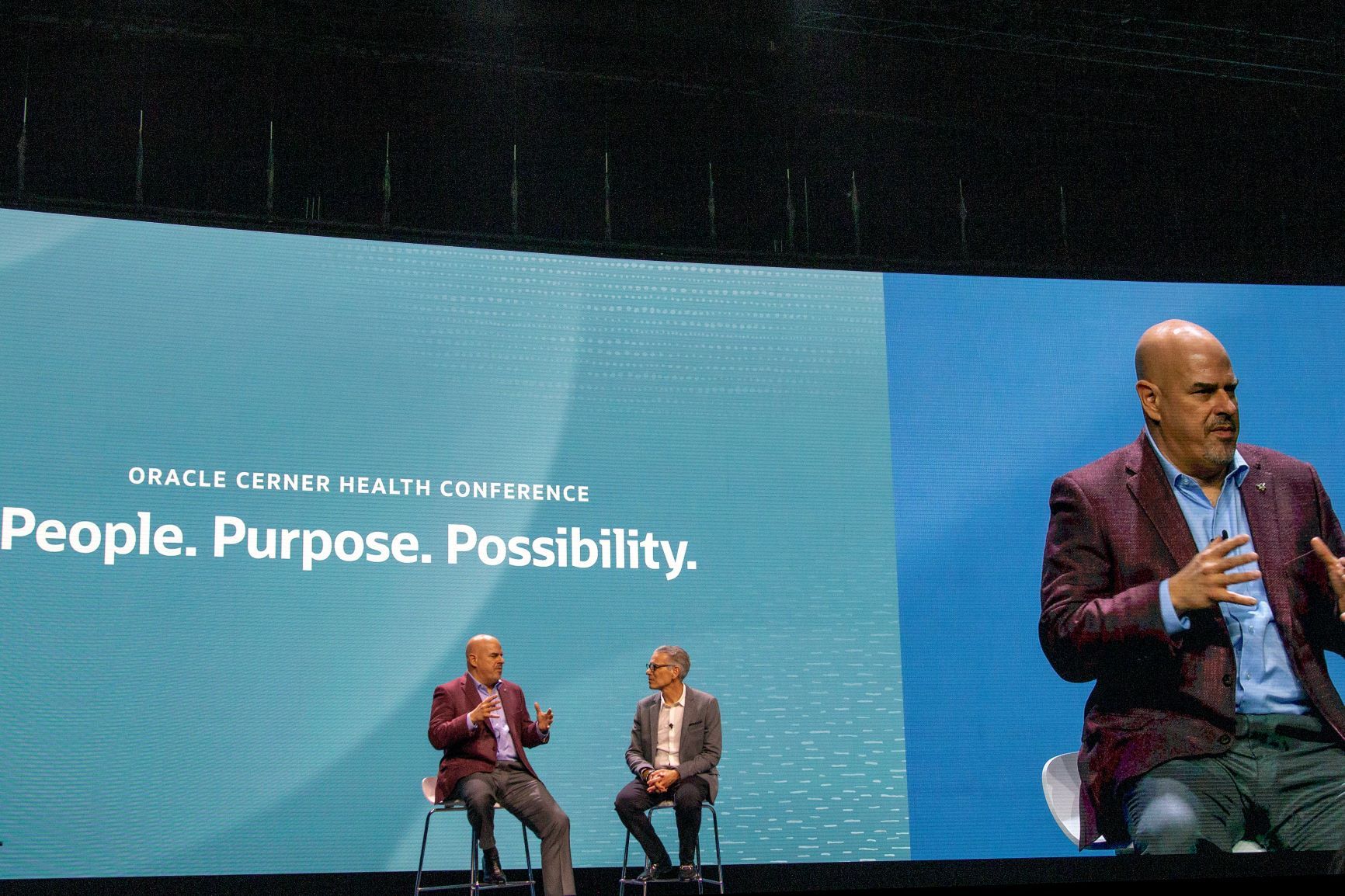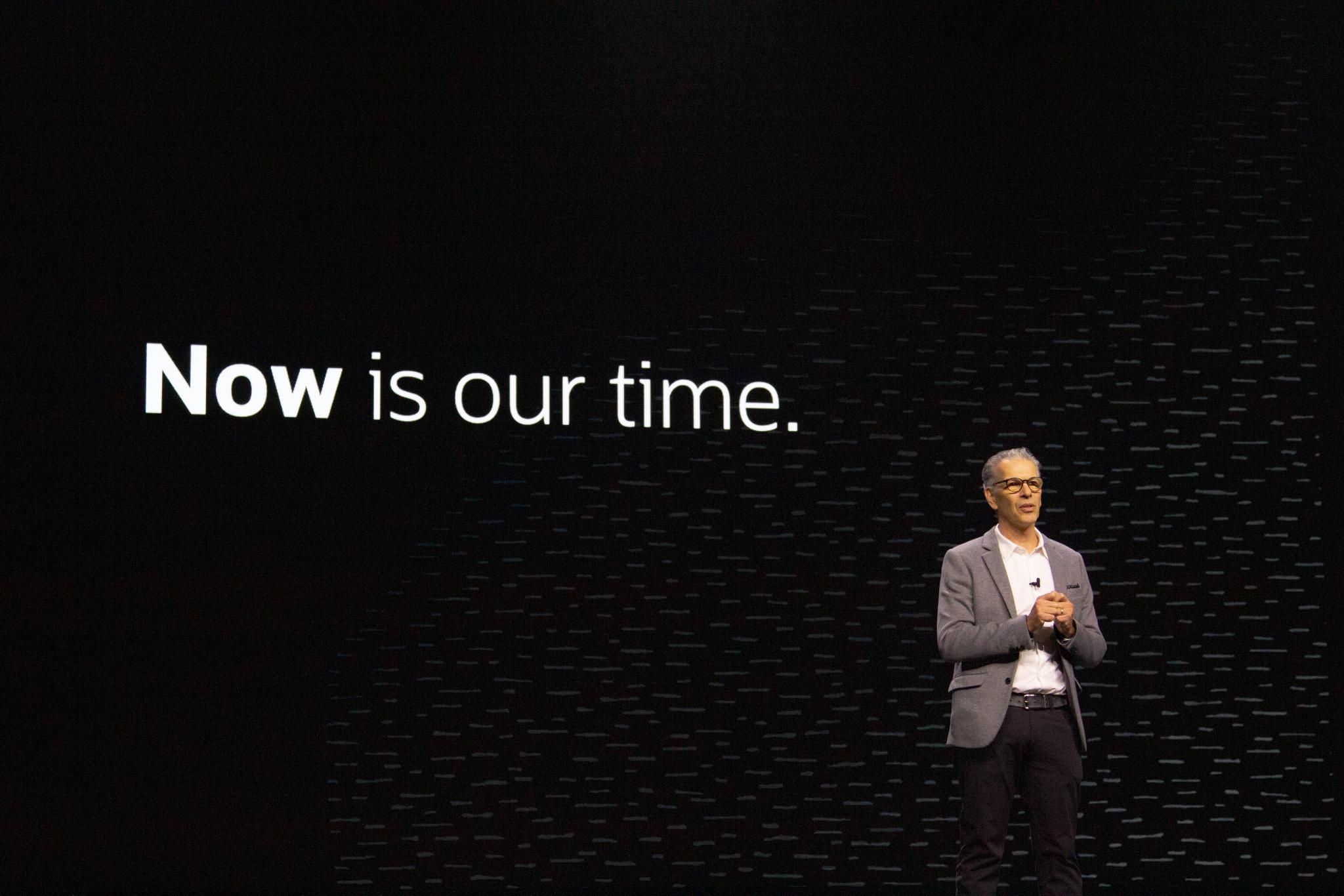Oracle Cerner touts big plans to transform healthcare
At a health conference, executives unveiled new solutions and sent a message that healthcare is the company’s focus.
Mike Sicilia, left, and David Feinberg of Oracle Cerner talk about the company's focus on healthcare at the Oracle Cerner Health Conference in Kansas City, Mo. Monday. (Image by Oracle Cerner)

Technology companies have made bold claims about their ability to fix the healthcare industry.
Mike Sicilia, the executive vice president of Oracle’s business units, said there’s a reason others have stubbed their toes, as he put it.
Speaking at the Oracle Cerner Health Conference in Kansas City Monday, Sicilia said tech firms have stumbled in the past because “they haven’t taken on enough of the problem.”
Oracle Cerner won’t make the mistake of thinking too small, Sicilia said.
Oracle Cerner is putting staff in addressing the information technology challenges of healthcare, from improving electronic health records to revamping back office systems, payment and claim systems. He said that’s the differentiator in Oracle Cerner’s approach.
The health conference comes a few months after Oracle completed its $28-billion acquisition of Cerner, the nation’s second largest electronic health records company .
In a June event, Larry Ellison, Oracle chairman of the board and chief technology officer, positioned healthcare as the focus of the company.
Sicilia and other Oracle Cerner executives certainly hammered home that message at the conference Monday, which was streamed online.
“This is the most important thing we’ve ever done in the history of Oracle,” Sicilia said.
David Feinberg, chairman of Oracle Health, touted the promise of one of the world’s leading technology companies with a leader in electronic health records.
“Oracle and Cerner are going to allow you to care for your patients and communities like never before,” Feinberg said.
David Feinberg of Oracle Cerner talks about the company's new offerings and its ambitions in healthcare at the Oracle Cerner Health Conference in Kansas City Monday. (Image by Oracle Cerner.)

New product offerings
Feinberg touted a new product, “Seamless Exchange,” designed to help providers see a clearer picture of a patient’s health history and eliminate duplicate information in electronic health records. The company says it brings in external and internal patient data while eliminating information overload. It’s being tested with some providers.
During the conference, Oracle Cerner offered a video clip of Samit Desai, chief medical information officer of Ascension Technologies, who has been working on a pilot of the system. Desai called the Seamless Exchange “transformative” in potentially improving outcomes, because teams have more information.
Travis Dalton, executive vice president and general manager of Oracle Health, spent 21 years with Cerner. But he said he’s as excited as he’s been in his career about the merger with Oracle. He said the goal is to make it easier for providers to access the right data when they need it, and that means refining the electronic health record system.
“Our number one priority is improving the EHR,” Dalton said.
Dalton touted a new dashboard that allows health systems to capture information from electronic health records more easily, such as health outcomes, patient experience and the system’s finances.
The dashboard can identify areas to reduce burdens on staff, such as examining how much time clinicians are spending on EHR, the company says.
Virtual models of care
Nasim Afsar, Oracle Health’s chief health officer, also highlighted a pilot program of what Oracle Cerner describes as virtual models of care.
Four health systems are piloting “virtual nurses” that do assessment and documentation of patients at admission and discharge, which can enable other nurses to perform physical assessments and spend more time caring for patients, Afsar said. She said the virtual models can help healthcare organizations that are grappling with labor shortages, a widespread problem.
“We are thinking deeply about the future of our workforce,” she said.
Around the country, nurses have left hospitals over the course of the pandemic. If those virtual systems can allow bedside nurses to spend more time with patients, Afsar said, “new virtual care models could bring some people back.”
Oracle Cerner also unveiled tools to streamline charting and documentation in ambulatory settings.
Among the improvements is integrated charting, which will allow care team members to find the information they need in a single view without digging through scores of old notes from other clinicians, the company says. The patient records also now include a new “problem summary,” which offers a quick synopsis of the patient's condition.
Afsar called the problem summary “a game changer.”
Oracle Cerner also pushed a new solution, RevElate, designed to simplify and reduce headaches in billing processes. Oracle Cerner hopes to release the new system widely before the end of the year. It will offer more automation and intelligence in billing, thus easing some burdens on staff, the company says.
‘Time to think big’
The array of new products and solutions underscores Oracle’s intentions to establish a greater presence in the healthcare industry.
Looking ahead, Sicilia also talked about 5G playing a bigger role, such as embedding 5G chips that will turn some devices into mobile laboratories, without any need for cables or WiFi.
“You’re going to see a lot of 5G technology turn up,” Sicilia said.
Oracle Cerner also stressed its ability to help healthcare providers gain more understanding of the social determinants of health and their impact on their patient populations. Executives also spoke about how the company's technology is enabling smaller hospitals, including critical access hospitals in rural areas, gain more access to clinical trials.
In some of his opening remarks in Monday’s keynote program, Feinberg stressed the goal isn't just to collect more information but to provide data in a way that will provide “inclusive, actionable insights.” He also talked about the goal of making healthcare “more open, more connected.”
“Now is the time to think big,” Feinberg said.
Children’s hospitals face complex challenges dealing with disasters
April 18th 2025Pediatric hospitals deal with different factors in weather-related events and other emergencies. Terri Wilson of the Children’s Hospital Association talks about the challenges and the need for more planning and support.
Telehealth faces a looming deadline in Washington | Healthy Bottom Line podcast
February 12th 2025Once again, the clock is ticking on waivers for telemedicine and hospital-at-home programs. Kyle Zebley of the American Telemedicine Association talks about the push on Congress and the White House.